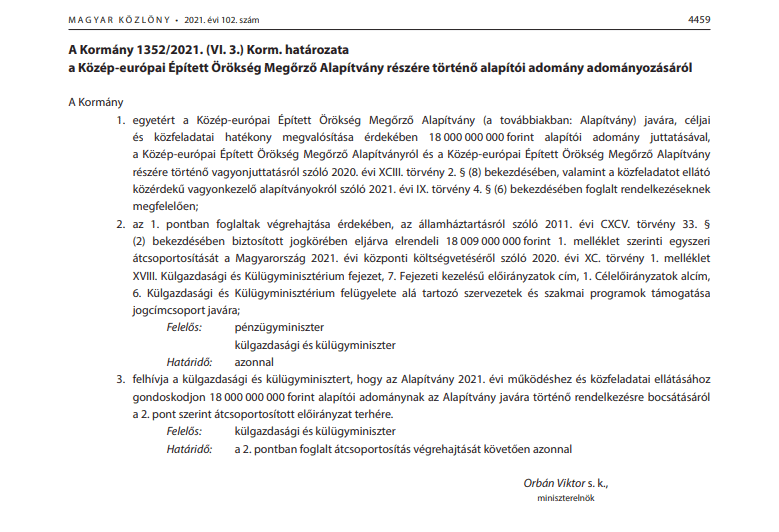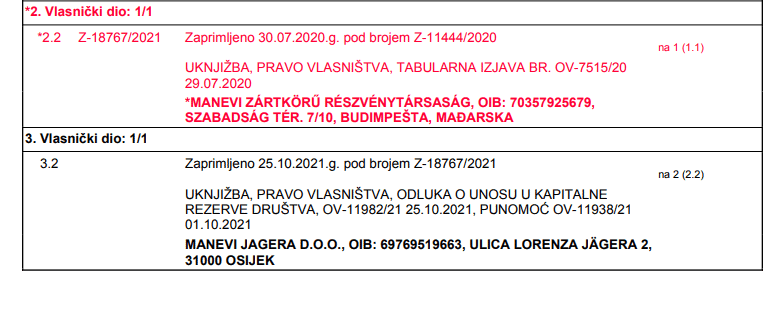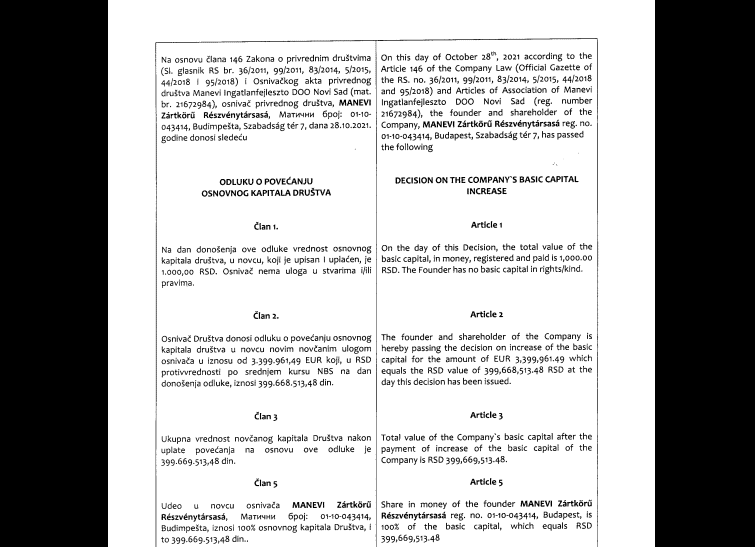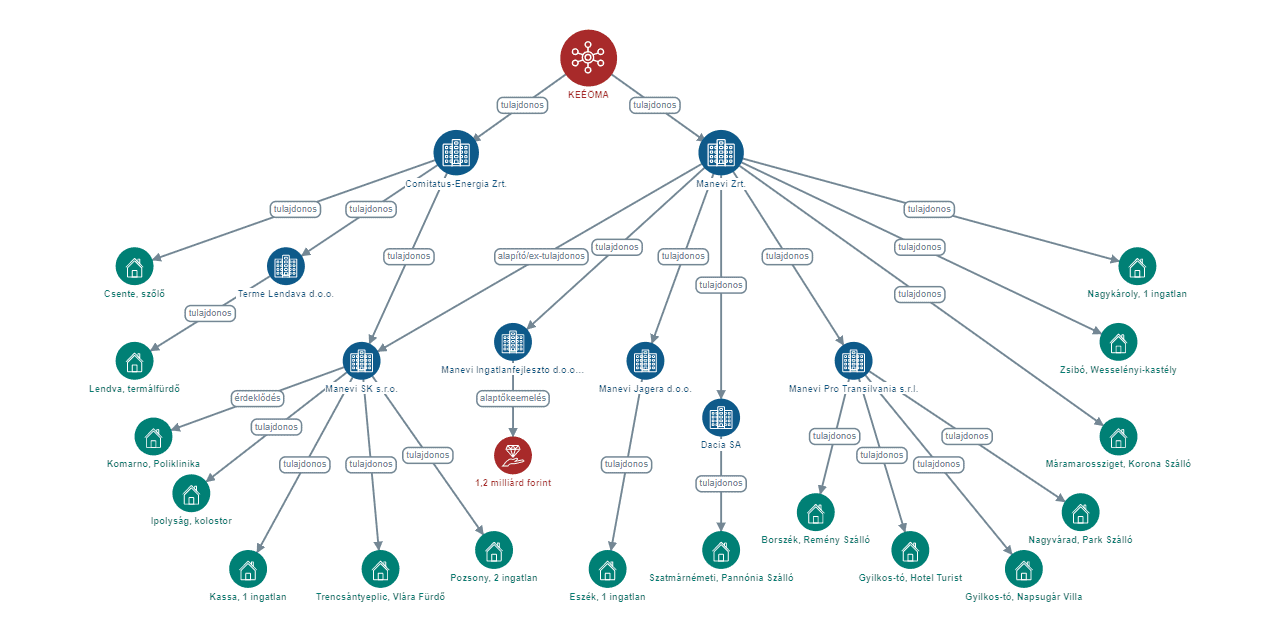The Hungarian government has donated two state-owned companies and a total of HUF 15 billion in state assets to the Foundation for Preserving Built Heritage in Central Europe (Közép-európai Épített Örökség Megőrző Alapítvány), which was registered this year. Although the Foundation, headed by State Secretary for Foreign Affairs Levente Magyar, is supposed to perform a public function by purchasing and renovating historical Hungarian properties in the Carpathian Basin, nothing about its activities is public, not even its website. The companies given to the foundation and their foreign subsidiaries have accumulated a total of 16 properties in the neighbouring countries by now. We have put them on a map and outlined the complex network of companies.
This article was originaly published on english.atlatszo.hu.
In June 2020, Deputy Prime Minister Zsolt Semjén (KDNP) submitted the bill on the establishment of the Foundation for Preserving Built Heritage in Central Europe to the Parliament. In his speech, Péter Szijjártó (Miniter of Foreign Affairs and Trade) said that the foundation would “contribute to the preservation of certain buildings and structures in the Central European region that are not protected as historic monuments, but are of cultural, historical, artistic or architectural value and of significance to Hungary”.
A gift of over 15 billion for the start
Unsurprisingly both governing parties, Fidesz and KDNP supported the idea, and the Parliament – in which the governing party MPs are in the majority – voted in favour. The government donated two state-owned companies, Manevi Zrt. and Comitatus-Energia Zrt.
More than half a year after establishing the foundation, it was registered by the court. The registration order also states that the state donated a total of HUF 15.8 billion in assets to the foundation. Of this, 600 million in cash, the rest in shares: the shares of Manevi are worth HUF 11.2 billion and the shares of Comitatus Zrt. are worth HUF 3.9 billion.
In September 2020, a government decree increased Manevi’s capital by HUF 5 billion and allocated HUF 600 million to the Foundation for Preserving Built Heritage in Central Europe. Another decree, adopted on 24 December 2020, i.e. on Christmas Eve, revoked the previous decision concercing the increased capital of Manevi, but donated another HUF 6 billion to the foundation in addition to the HUF 600 million.
In June 2021, 3 months after its registration, KEÉÖMA received another huge amount of money: the government allocated HUF 18 billion to the foundation “for the benefit of the effective implementation of its objectives and public tasks” from the Economic Protection Fund.
The Economic Protection Found was created by the Hungarian government in April 2020, originally with a budget of HUF 923 billion, but so far, the government has spent HUF 3,628 billion. The original aim was to remedy the negative consequences of the coronavirus pandemic, but according to the article of HVG, only about a quarter of the total amount was spent on actual crisis management.

The government decreee about the HUF 18 billion donation to the foundation.
16 properties in 4 countries
In May, the two (formerly) state-owned companies, Manevi Zrt. and Comitatus-Energia Zrt. had a total of 4 properties abroad: a wellness centre in Lendava, Slovenia, for Comitatus, a listed building in Osijek, Croatia, for Manevi, and two hotels in Romania, the Pannónia Hotel in Satu Mare and the Korona Hotel in Sighetu Marmației.
In autumn, we began to publish a series of articles about the other purchases of the companies that belong to the Foundation for Preserving Built Heritage in Central Europe. Manevi Zrt. claims they have no properties abroad, but they actually have several in Romania. In addition, their Romanian subsidiary (Manevi Pro Transilvania) bought the Park Hotel in Oradea this summer, and their Slovakian subsidiary (Manevi SK) has also bought several buildings.
Later, the Romanian subsidiary of Manevi bought two more properties. According to the Romanian property registry, two hotels located near the popular tourist destination of Red Lake have been acquired.
Most recently, we reported that the Slovakian subsidiary, Manevi SK is no longer owned by Manevi Zrt. since mid-November, but by another former state-owned company, Comitatus-Energia Zrt. Manevi SK is now bidding to buy another famous building in Slovakia, the former Polyclinic.
Meanwhile, Átlátszó Transylvania investigated a rumour which turned out to be true: Manevi Pro Transilvania bought another property in Romania, which is actually a ruin, as the former Hope Hotel in Borsec has collapsed down to the basement.
This means that the Foundation has 8 properties in Romania, 5 in Slovakia, 2 in Slovenia and 1 in Croatia. These are proven to be owned by companies and their subsidiaries that have been given to the Foundation, according to local property registers, but because of the fact that the name of the owner cannot be searched in these land registry databases, it is possible that there are still buildings that we do not know about.
We have put them all on a map (the red ones are Manevi and its subsidiaries, the purple ones are Comitatus and its subsidiaries).
Subsidiaries in Croatia and Serbia
As indicated on the map, the building in Eszék is no longer directly owned by Manevi Zrt., but since 25 October 2021, it belongs to Manevi Jagera d.o.o.

Title deed of the property in Eszékk at the end of November 2021 (source: Croatian Property Registry/Ostro)
Not surprisingly, the company registered in May is owned by Manevi Zrt. Manevi plans to turn the 2 036 m² building on a 759 m² plot into a four-star hotel, according to a tender announced in February.
But it is not only in Croatia where the company is expanding, as the Ján Kuciak Investigation Centre in Slovakia (ICJK) revealed at the end of October, it already has a subsidiary in Serbia. During our research, we found a new piece of information about the company.
In the company documents of Manevi Real Estate Developer d.o.o., which was registered in April 2021, a substantial amount of money appeared in mid-November: according to a decision of 28 October 2021, Manevi Zrt. increased the share capital of its Serbian subsidiary from 1000 Serbian dinars (about 3,000 forints) to nearly 400,000 dinars (about 1.2 billion forints). It is possible that a planned upcoming purchase justified the capital increase.

Announcement on the capital increase of Manevi Ingatlanfejleszto d.o.o. (source: SBRA)
The two (formerly) state-owned companies donated to the Foundation for Preserving Built Heritage in Central Europe, Manevi Zrt. and Comitatus-Energia Zrt., therefore now have a total of 6 subsidiaries abroad, according to our current knowledge: 4 for Manevi (2 in Romania, 1 in Croatia and 1 in Serbia) and 2 for Comitatus (1 in Slovakia and 1 in Slovenia).

Network of companies connected to the Foundation for Preserving Built Heritage in Central Europe and their properties abroad
Board of Trustees full of members close to the government
In April this year, the Foundation became one of the 33 public-interest trusts providing public functions. This means that the State has no say in what it does with the (formerly) public assets that it has been given, nor can it reclaim these assets, nor can it dissolve the foundation if it is dissatisfied with its operation.
The public functions of the Foundation for Preserving Built Heritage in Central Europe are defined by law, which is, for example to ensure the preservation of the historical, cultural and built heritage of the region with Hungarian relevance, to support organisations engaged in educational, cultural and scientific research activities in the field, to carry out educational activities, and to organise events related create an online presence that attracts the public.
The Foundation has no website, e-mail or telephone contact details and, although it was set up with public funding to fulfil a public task, it does not publish information in the public interest. In other words, its operations are opaque, so it can practically do whatever it wants with the public funding it receives from the government.
“It has lost the character of public money” – this famous sentence from 2016 best describes the essence of the new system which created the public interest trusts with public tasks. Although this intention – which would have encrypted the documents of the economic enterprises and foundations of the Hungarian National Bank – was struck down by the Constitutional Court at the time, the ruling party was able to legislate the method this year, by which public assets are transferred to private hands close to the party by creating the concept of public interest trusts with public tasks.
It was, of course, ensured that all these trusts were run by trustworthy people close to the government. This is no different in the case of the Foundation for Preserving Built Heritage in Central Europe: its Board of Trustees is chaired by Levente Magyar, who is also Parliamentary State Secretary and Deputy Foreign Minister, as well as Ministerial Commissioner for Francophone Affairs.
The members of the Board of Trustees are Péter Kiss-Parciu (Deputy State Secretary for Regional and Border Economic Development at the Ministry of Foreign Affairs), Orsolya Mária Pacsay-Tommasich (State Secretary for the Hungarian Diplomatic Academy and the Stipendium Hungaricum Programme at the Ministry of Foreign Affairs and Trade), Gergely Jákli (CEO of Eximbank) and Zsolt Virág (Ministerial Commissioner for the National Castle Programme and the National Castle Programme).
The trust is such an autonomous body that the government of the day has no say in the composition of the board of trustees, for example, if one of them is removed, the others elect a replacement. In other words, complete independence from the state poses a great danger not only because of the lack of control over the spending of money, but also in personal matters: even if there is a change of government, Fidesz members will still be left at the helm of foundations that are stuffed with public money, such as Szijjártó’s deputy at the head of the Foundation for Preserving Built Heritage in Central Europe.
Translated by Zita Szopkó. The original, Hungarian version of this article was written by Katalin Erdélyi and can be found here.
This article was produced in the framework of a joint project of Átlátszó and Átlátszó Erdély, with the support of News Spectrum. The Hungarian company data was provided by Opten Kft. Data for Croatia was provided by Oštro. Cover photo: MTI/Szilárd Koszticsák.
 Support independent investigative journalism in Hungary,
Support independent investigative journalism in Hungary,
become a patron of Atlatszo on Patreon!
You can also donate here.







